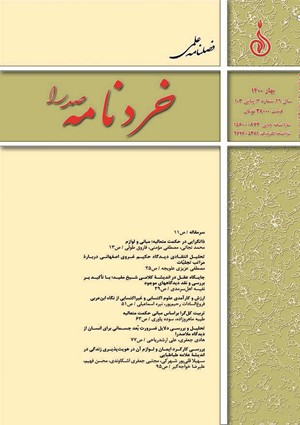تربيت كلگرا بر اساس مباني حكمت متعاليه
محورهای موضوعی : ملاصدراپژوهی و اندیشۀ حکمت متعالیهسوده یاوری 1 , طیبه ماهروزاده 2 , علی ستاری 3
1 - دانشجوی دکتری فلسفه تعلیم و تربیت، دانشگاه الزهرا، تهران، ایران
2 - دانشیار گروه مدیریت و برنامهریزی آموزشی دانشگاه الزهرا، تهران، ایران
3 - استادیار گروه مدیریت و برنامهریزی آموزشی دانشگاه الزهرا، تهران، ایران
کلید واژه: تربيتكلگرايي عقلانيت حكمت متعاليه صدرالمتألهين,
چکیده مقاله :
«تربيت كلگرا» يكي از رهيافتهاي تربيتي قرن بيستم در غرب است كه با كاستيهاي موجود در نظام تربيتي مدرن مقابله كرده است. با اندكي توجه ميتوان شباهتهايي بين تعليم و تربيت ديني و اسلامي با اين روش تربيتي يافت؛ تا آنجا كه ميتوان گفت تربيت كلگرا شيوة رايج تربيت در نظام آموزش سنتي ما بوده است. اين پژوهش به طرح برخي از اصول تربيتي در حكمت متعاليه ميپردازد كه ذيل مفهوم «كلگرايي» قرار ميگيرند. برخي از اصول مطرح شده عبارتند از: لزوم جمع ميان ماده و معنا، تربيت بدن بهمراه روان و كلگرايي اخلاقي و معرفتي. همچنين در ذيل كلگرايي معرفتي به جايگاه ويژة عقل در معرفتشناسي پرداخته شده و اصول تربيتي متناسب با عقلانيت استخراج گرديده است كه از جمله آنها محاسبه و لزوم آموزش تعقل به متربي است. در انتها برخي از روشهاي اجرايي متناسب با اصول ياد شده، آمده است. اين تحقيق از روش كيفي تحليل محتوا و استنتاج فلسفي بهره برده است. به اين ترتيب كه با مراجعه به كتابهاي صدرالمتألهين در حكمت متعاليه و برخي از شارحان وي، به استخراج اصول تربيتي متناسب و در راستاي كلگرايي پرداخته است.
Holistic education is one of the educational strategies of the 20th century in the West which challenges the existing defects in the modern educational system. Clearly, there are so many similarities between religious and Islamic education and holistic education that we can safely claim that the latter has always been the common method of education in our traditional educational system. The present study focuses on certain educational principles in the Transcendent Philosophy which can be categorized under the concept of holism. Some of these principles include the necessity of the gathering of matter and meaning, educating the body along with the soul, and moral and epistemological holism. Moreover, regarding epistemological holism, the authors elaborate on the particular place of reason in epistemology and derive a number of educational principles in conformity with rationality, among which reference can be made to the necessity of prudence and necessity of teaching intellection to the learner. Finally, they refer to some of the practical methods in conformity to the mentioned principles. Following the qualitative method of content analysis and philosophical inference, the authors have tried to derive a number of educational principles in line with holism through delving in Mullā Ṣadrā’s books on the Transcendent Philosophy and some of his commentators’ works.
قرآن كريم.
نهجالبلاغه، ترجمه محمد دشتي، قم: لقمان.
باقري، خسرو و همكاران (1389) رويكردها و روشهاي پژوهشي در فلسفه تعليم و تربيت، تهران: پژوهشكده مطالعات فرهنگي و اجتماعي.
حسيني، جمشيد (1394) تربيت فلسفي در حكمت متعاليه، با مقدمة احمد بهشتي، تهران: بنياد حكمت اسلامي صدرا.
حلي، حسن بن يوسف (1371) الجوهر النضيد في شرح منطق التجريد و يليه رسالة التصور و التصديق، قم: انتشارات بيدار.
طباطبايي، سيدمحمدحسين (1348) شيعه در اسلام، قم: دفتر تبليغات اسلامي.
طباطبايي، سيدمحمدحسين (1371) شيعه، تهران: دفتر نشر فرهنگ اسلامي.
طباطبايي، سيدمحمدحسين (1374) الميزان في تفسيرالقرآن، ترجمه سيد محمد باقر موسوي همداني، قم: دفتر اسلامي.
طباطبايي، سيدمحمدحسين (1375) اصول فلسفه و روش رئاليسم، با پاورقي استاد مرتضي مطهري، تهران: صدرا.
طباطبايي، سيدمحمدحسين (بي تا) بررسيهاي اسلامي، بي جا: هجرت.
قمي، شيخ عباس (1384) مفاتيحالجنان، ترجمه مهدي الهي قمشهاي، قم: دانش.
ماهروزاده، طيبه (1395) مباني فلسفي و اجتماعي سكولاريسم و مدرنيسم، تهران: سمت.
محمدي ريشهري، محمد (1377) ميزان الحكمه، قم: دارالحديث.
محمدي ريشهري، محمد (1379) علم و حكمت در قرآن و حديث، قم: دارالحديث.
ملاصدرا (1380) الحكمةالمتعالية في الاسفار الاربعة، ج7، تصحيح و تحقيق مقصود محمدي، تهران: بنياد حكمت اسلامي صدرا.
ملاصدرا (1381الف) المبدأ و المعاد، تصحيح و تحقيق محمد ذبيحي و جعفر شاهنظري، تهران: بنياد حكمت اسلامي صدرا.
ملاصدرا (1381ب) كسر أصنام الجاهلية، تصحيح و تحقيق محسن جهانگيري، تهران: بنياد حكمت اسلامي صدرا.
ملاصدرا (1382) الحكمة المتعالية في الاسفار الاربعة، ج3، تصحيح و تحقيق مقصود محمدي، تهران: بنياد حكمت اسلامي صدرا.
ملاصدرا (1383) الحكمة المتعالية في الاسفار الاربعة، ج1، تصحيح و تحقيق غلامرضا اعواني، تهران: بنياد حكمت اسلامي صدرا. ملاصدرا (1389) اسرار الايات و انوار البينات، تصحيح محمدعلي جاودان، تهران: بنياد حكمت اسلامي صدرا.
ملاصدرا (1390) رساله سه اصل، تصحيح و تحقيق سيدحسين نصر، تهران: بنياد حكمت اسلامي صدرا.
ملاصدرا (1391) شواهد الربوبيه، تصحيح و تحقيق سيدمصطفي محققداماد تهران: بنياد حكمت اسلامي صدرا.


